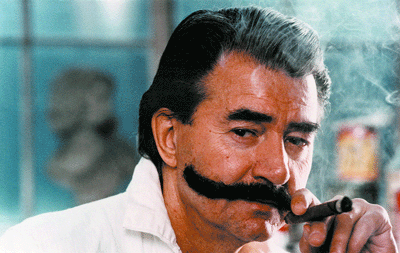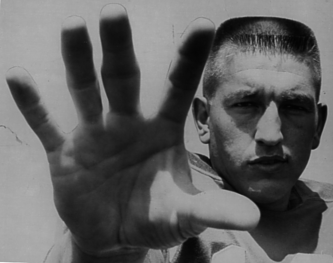Here’s a treat from Ross Wetzsteon. Originally published in the Aug. 1, 1985, issue of Sport magazine, it is reprinted here with permission of the author’s widow, Laura Ross.
Idols grow old like everybody else. Dick Young was once the patron saint, the most respected sportswriter in America, the one who changed all the rules, the guy who brought street smarts into the sports pages. He’s still the dean of American sportswriters, the most widely read and highly paid sports columnist in the country—and yet it’s not easy to find a colleague who has a good word to say about him.
When you finish reading one of his columns in the New York Post, they say, you have to take out your handkerchief and wipe the spittle off your face. “Young Ideas,” the title of his column, is “the greatest misnomer since Charley Winner.” As a baseball and football writer “he used to hang out with the players, but now all he does is suck up to the millionaire owners.” As a boxing writer “he would have no problem picking out Larry Holmes at a DAR convention.” “His values are sick and corrupt,” says a former New York Times sportswriter. And yet after saying all this—and adding that his “My America” tirades would embarrass Jerry Falwell, that his cranky obsessions are ruining his column into a one-man vigilante gang—even his sternest critics are unanimous in conceding that “the son of a bitch was still the best day-to-day writer who ever lived.” “The younger writers all loathe him,” says a veteran who’s worked with him more than 40 years, “but the thing they still have to learn from us old-timers is that you can only hate Dick Young 90 percent of the time.”
It’s partly a matter of generational style. Sitting in the front row of the press box at the World Series, the Super Bowl, the championship fight, bobbing his head up and down like a belligerent bantam, rapidly clawing out notes in his lefthanded scrawl, Dick Young, even at 67, looks like he should be in a Thirties B movie—the only thing missing is a snap-brim fedora with his press card jauntily stuck in the band. Dick Young belongs to the days when sportswriters banged out their stories on carriage-snapping typewriters, a cigarette dangling from their lips, a shot glass of bourbon at their side.
But it is his confrontational style that’s made him so many enemies. You’re drawn in by his lean, breezy, rat-tat-tat, three-dot prose, and then you realize what he’s saying (a litany of Genghis Khan causes, from anti-unionism to Red-baiting to good ol’ capital punishment), and even more clearly the tone in which he’s saying it (not just caustic but downright churlish; not just opinionated but out-and-out ranting). Is it any wonder that colleagues who began their careers by imitating his street-smart stance, his wiseass skepticism, now regard him as a doddering fossil?
People who’ve been reading Dick Young for only 10 years or so remember little more than his vicious vendettas (almost single-handedly driving Tom Seaver out of New York), or his ethnic insensitivities (advising his Spanish-speaking readers to leave their spray cans at home when visiting the reopened Yankee Stadium), or his hit-and-run blind items (“I’ve heard a rumor why the Johnny Benches split up,” he once wrote, “and I’ll never believe it”—end of item), or his mad-dog savaging of “druggies” (he could understand an athlete wanting a little on the side, he commented on the Edwin Moses prostitute/drug bust, but using those controlled substances was unforgivable). Dick Young is not a writer Hallmark would hire.
And yet if you go back more than 10 years, there’s another side to Dick Young. In the evolution of sportswriting from adolescent mythologizing to tell-it-like-it-is honesty, Dick Young was arguably the single most important transitional figure. There’s a better way to describe the arc of Dick Young’s career than to say he was a street-smart kid who rose to patron saint who degenerated into crotchety old man. And that’s to say that while his politics may be as reactionary as Louis XIV’s, his professional role has been as radical as Robespierre’s. What his detractors fail to understand is that there are many battles they don’t have to fight because Dick Young has already fought them—and won.
“What good can you say about a writer,” snips a columnist for a national newsweekly, “who thinks his greatest contribution to the English language is the word ‘horsespit’?” Well, one thing you can say is that when Dick Young began covering the Brooklyn Dodgers in the mid-Forties, baseball writing was characterized by a different kind of horsespit. One New York daily would lead off its story, “The mighty bats and nimble gloves of the visitors from St. Louis yesterday vanquished. . . .” But Dick Young was writing, “This story belongs on page three with the other axe murders.” When he’d begin his stories with fabled leads like “It was so cold out there today even the brass monkey stayed home,” he singlehandedly replaced the pompous poetry of the press box with the cynical poetry of the streets. “It may not seem that innovative today,” says Vic Ziegel, executive sports editor of New York’s Daily News, “but at the time we felt like people must have felt in the Twenties when they first heard Louis Armstrong.”
“How you going to deal with a guy whose enemies list makes Nixon look like Gandhi,” asks another young sportswriter. Well, one way you can deal with him is to remember that when Dick Young first began covering baseball, sportswriters were shameless shills for their teams, keeping the players at a heroic distance, settling for phonily alliterative nicknames like Joltin’ Joe or the Splendid Splinter. So when Young brought his cut ‘n’ slash opinions into his coverage, writing “it was a typical 400-foot Gene Hermanski drive, 200 feet up and 200 feet down,” readers were shocked. Mythic figures, bullspit; Dick Young drank in the same bars as these guys. If we take the warts-and-all closeups of today for granted, we’re neglecting to give him credit.

Dick Young, they say, has broken so many stories because he’s a mouthpiece of management. Come again? When Dick Young first began covering baseball, writers routinely showed up in the press box five minutes before the game and only visited the lockerroom if the press box toilet was broken. “I had to stop by the clubhouse at 11:00 one morning,” says a colleague from those day, “and Dick Young was already there, sitting on his haunches beside the trainer and a ballplayer, taking notes. That was the first time I ever saw a writer in the lockerroom at anytime, so don’t tell me he got handouts from the front office.”
Then they say Dick Young is contemptuous of his colleagues, a competitive son of a bitch who’ll knee you in the gut for a beat. But his critics don’t know this story—it’s never been printed until now. Joe Trimble, Dick Young’s colleague at the Daily News, is sitting at his typewriter in the press box at Yankee Stadium, staring at a blank piece of paper. An hour ago Don Larsen pitched a perfect game in the World Series and now the press room downtown is freaking out—where’s Joe Trimble’s story? “I’m blank,” Joe Trimble says to Dick Young in a cold-sweat panic. “I can’t write a word.” Dick Young calmly rolls a piece of paper in his own typewriter, types out a sentence, takes out the paper and hands it to Joe Trimble. “The imperfect man pitched a perfect game.” Forty-five minutes later, Joe Trimble’s story is finished, it’s the best story of his career, he wins awards for that story—and Dick Young never says a word.
Brash, vulgar, pushy—that’s yet another count in the indictment. But hey, the man is a reporter, not a hired gun. Dick Young walks into the press conference where it will be announced that Doug Flutie has signed with the USFL. He sees a row of chairs occupied by TV people, celebrities, Donald Trump favorites and flunkies, sees the newspapermen standing three and four deep at the back. So he walks up the steps to the stage, sits down on a wall in front of the podium and takes out his notepad. Donald Trump’s security goons politely ask him to move. Choosing his words with the care if not the vocabulary of Flaubert, he informs them that this is a press conference, that he’s press and goddamned if he’s going to budge. They find him a chair near the podium. Christie Brinkley may be there to get her picture in the paper, but Dick Young is there to get his story.
“Gimme a beer,” says Dick Young. “Whadda ya wanna know?”
Some of your younger colleagues think. . .
“Shit, those young guys. They don’t work hard enough, they don’t work the phones, they don’t have any respect for themselves as professionals. I remember when the New York Times started giving days off in spring training! They’re in Florida, for Christ’s sake, and they want a day off! Me? I only write five columns a week these days. Piece of cake.”
Mike Lupica of the New York Daily News says. . .
“Mike Lupica? He’s a newspaper version of a spoiled-brat ballplayer,” Dick Young snaps. “He writes bullshit based on his lack of experience.”
Dick Young’s not an off-the-record guy. Skipping all over the place, talking just like his Friday column, “Clubhouse Confidential,” a sentence, three dots, on to something else, three dots, on to something else. Next question?
Murray Chass of the New York Times? “He’d sell his soul for access.” Maury Allen of the New York Post? “Careless with facts and quotes.” Jim Murray of the Los Angeles Times? “Just a gagster.” Dick Young is the same with nearly all his colleagues. Not angry, not even sarcastic, just matter-of-fact rat-tat-tat. Next question.
Howard Cosell? “Howie the Shill? A fraud. An ass. A pompous ass. Those are the good things I can say about him. Now what about the other side?” Dick Young leans back in his chair and grins from sideburn to sideburn. He’s feeling almost benevolent. Lucky you didn’t catch him in a bad mood. “Cosell gets more and more obnoxious over the years, but people who say I go after him too much don’t realize that I’ve never written a whole column about him. He’s not worth it. Just a little shot here and there.”
(For his part, Howard Cosell declined to comment, but he once told an interviewer, “He’s a sick, troubled person. He’s a hate merchant, crazed, who’s been writing trash and abuses the First Amendment.”)
You were saying how you used to steal papers when you. . .
“Not steal, borrow,” says Dick Young sharply. “We used to borrow paper from the candy store, check out the box scores, then put them back.” A law-and-order kid. “I had a wonderful childhood. Sure, my parents were divorced when I was three, but it pisses me off when I hear about some guy who sobs his way to the electric chair because he came from ‘a broken home.’ Icame from a broken home, and I always felt I was one of the luckiest guys alive.”
Dick Young’s mother was an American Jew of German descent, his father a Russian Jew. From age 6 to 12, he was boarded out with an Italian Catholic family. Talking about growing up in Washington Heights (a lower-middle-class neighborhood in upper Manhattan), about getting an 87.5 average in high school (“and a better education than lots of colleges give you these days”), about playing stickball in the streets (“I was one of the best around”), about going to the old Madison Square Garden or the Polo Grounds (“I was always a Giants fan”), he’ll sometimes go three sentences in a row without bursting into an angry denunciation of the hoods and druggies who’ve desecrated his idyllic past. The Depression Thirties? Idyllic? There’s no nostalgia quite as proud as that of a man who survived hard times.
After graduating from high school, Dick Young went to California to stay with his father, a cameraman in Hollywood. Didn’t work out. Los Angeles Junior College; kicked out when he couldn’t afford the non-resident fee. Joined the CCC; shipped to upstate New York, helped build a state park, still proud of that. Heard the Daily News was hiring, $15 a week. Hitchhiked to New York, turned out they wanted college graduates. Said he’d go to college at night. Took classes at NYU, worked his way up at the News. Finally, after five years, covered his first game, at the Polo Grounds, then given his first beat, the ’46 Dodgers, and before long another big promotion, this time to patron saint.
“I didn’t even want to be a sportswriter,” he says. “I wanted to be a hot-shot newspaperman like Walter Winchell. I wanted to be a stop-the-presses guy, competing with the other paper for the scoop and for the girl. I didn’t go for that fancy writing—still don’t. Some guys think they can fool sports fans with, quote, good writing, unquote, but the fan knows when he’s being bullshitted by a cute line. If you’ve got the story you report it, if you don’t you write it. A newspaper isn’t like a book, for Christ’s sake. When you’re through with it you throw it out and buy a new one.”
Dick Young writes over 4,000 words a week—which adds up to nearly 10 million words in his career, 100 books or so, give or take a War and Peace. For nearly four decades Dick Young wasthe Daily News, the most popular feature in the country’s largest-selling newspaper—a survey once showed that he was singlehandedly responsible for over 50,000 sales a day. But then, in 1981, rumors began to circulate that the Daily News might fold, and suddenly there’s Dick Young, the man who chastised Tom Seaver (“Be a man and honor your contract”) breaking hiscontract and jumping to the New York Post. Hypocrisy was the kindest word they used. Loyalty. Horsespit.
“People think they see an analogy, right?” Dick Young uses the word scornfully, like an epithet. Suddenly his anger seems less genial. “Just for openers,” he says, “there’s a helluva difference between a guy who works 45 years for an organization and a guy who works five years. And as for the money, the difference wasn’t that great. I only got a raise from $115,000, to $125,000 [he makes $155,000 now]. My dream situation was to work for 50 years at the News and then have a goodbye party when I reached 69. But there I was, 63½ years old, they’re talking about closing down the world’s greatest newspaper and how many places will give a job to a guy 63½ years old?”

A lot of people feel Dick Young has lost his pop in the Post, that the Goetz-for-President tabloid has encouraged his pugnacity at the expense of his populism, turning him into a knee-jerk Neanderthal. Drugs, for instance.
“Nothing is as bad as drugs,” Dick Young says furiously. “Nothing. I get so angry when I see our country threatened by drugs. Ballclubs used to punish a guy for the slightest moral deficiency, but nowadays they welcome him back with open arms. I’ll get out of this business before I’ll beg a druggie to talk to me.”
Where does this rage come from, a bad experience? “Me? I only take one aspirin, for Christ’s sake.” The Dick Young segue—even in his fury he retains his humor. “I even gave up Camels—that was the closest thing to heroin in my time.”
Race? That’s a bit more complicated. Dick Young was one of Jackie Robinson’s earliest champions, but according to one of his colleagues on the Dodgers beat he once confided, “I can never forget he’s black” (to which Robinson responded, “I never want him to”), and was always closer to the nonmilitant Roy Campanella.
“I was all for Jackie,” says Dick Young, “but he thought everything that happened to him was because of his color. Racism was sometimes a crutch for Jackie. I can understand it, but that doesn’t make it right. And don’t give me any crap, racism is a two-edged sword. Blacks are as racist as anyone these days‚ maybe more so.”
This isn’t the kind of speech that’s going to win Dick Young any Brotherhood of Man awards. But while this kind of insensitivity appalls his white colleagues, his “I won’t bullshit you” stance has won him the grudging respect of many black athletes. Take Ali, for example.
“I was down on Ali at first,” Dick Young admits. “I felt he was exploited by the Muslims. He was a commercial racist, he didn’t hate white people, he just pretended he did in order to sell tickets. Anyway, one day Bundini Brown came over to me and said, ‘You guys should talk,’ and I said, ‘I’d be glad to.’ We had long discussions after that—politics, religion, everything. I still disagree with him, but we respect each other now. In his dressing room after his last fight, down in the Bahamas, we even kissed each other on the lips.”
Okay, that answers the question: Does Dick Young ever change his mind about anything? Still, one wonders if Ali really belongs in Dick Young’s America. “My America,” he calls it, President Young addressing his constituency, a land of afternoon ballgames, hardworking newspapermen, respect for Mom—and electric chairs.
“I know it bugs people. That’s why I do it. I use ‘My America’ almost facetiously now, just to needle people. But look, I was brought up in the greatest country in the world. To me, patriotism isn’t a matter of flag-waving but of the work ethic and respect for authority—those are the values I was brought up on.”
In Dick Young’s America, drugs are evil, unions are ruining sports and black athletes use racism as a “crutch.” But it’s revealing that he’d even suggest he’s only kidding. Dick Young’s politics are in the grand old tradition of American populism, of the little guy, of the boys in the bar, of the blue-collar, of the hardhat—of democratic bigotry.
“To me, there’s no such thing as a liberal or a conservative. It’s only this case, this case, this case—whose side deserves to be attacked at a particular time.” In Dick Young’s defense, it has to be pointed out that he’s led the fight for access to lockerrooms for women sportswriters. “They’re just doing their jobs,” he says, “they deserve to be treated like professionals. Why do the so-called liberals always lay claim to what’s right?”
Wiseass, sarcastic, swaggering—with a gutter wit, a toe-to-toe combativeness and most of all a tabloid cynicism that’s been elevated to the status of a political philosophy—never forget, Dick Young comes from the Thirties of The Front Page, not Norman Rockwell; he grew up in the Depression of Our Gang, not Eleanor Roosevelt. At times he seems less interested in changing your mind than in getting your goat.
“Today’s writers don’t have enough guts,” he says. “They let themselves be pushed around. The players give them all that crap and they accept it”—it’s hard to tell who ticks him off the most, the players or the press. “They even have ropes around the batting cage in spring training! Jesus Christ, how’m I supposed to do my job?” Three dots later and he’s off on druggies again, then three dots and he’s after the goddamned unions, then three dots and he’s dumping on a lazy colleague or a spoiled-brat player or even his own paper. “‘Today is Friday, the Post learned exclusively’—what the hell’s happened to our profession?”
When you read this stuff in his column you’re reminded of the obstinate dogmatism of the self-educated, but when you hear it it almost has a certain. . . charm. Even in his most vitriolic tirades there is a spark of wit, a flash of style. Dick Young may be the most opinionated, abusive, foul-mouthed bastard in an opinionated, abusive, foul-mouthed business, but still. . .
At the press conference after the first Ali-Frazier fight, Ali went into one of his harangues, berating the judges’ decision and announcing that be was going to organize a nationwide vote to let the people decide who won the fight. Everyone’s furiously scribbling notes when Dick Young’s voice suddenly pipes up. “You’ll lose,” he tells Ali. “Most of the brothers are in the slam and are ineligible to vote.” The reporters are aghast. Ali is speechless. But then suddenly he leans back and roars with laughter, the reporters join in and the harangue is history.
So what if he sometimes dresses like a cross between a senile hippy and a linoleum salesman—plaid pants, Day-Glo jackets, even, for a time in the Seventies, a medallion on his chest with a Miami Beach sport shirt open to his waist. What really keeps him young is the sharp one-sentence comeback, the snappy put-down. Dick Young, an embittered old man? No way. He’s still a brash, cocksure, pugnacious, candy-store kid who happens to be 67 years old.
In the meantime, the beat goes on—”in the sweatshop conditions of his Florida spring training camp,” Dick Young will write on a typical day, “where he works two-to-three hours a day and spends the rest of the time around the pool or on the golf course, Kent Tekulve has warned the plantation owners of baseball that the players are running out of patience. They aren’t going to put up with their terrible lives much longer. ‘We don’t want a strike, but if our backs are to the wall we’ll do it’ . . . a wall that most people wouldn’t mind being backed up against . . . . The players want to strike? Let ’em.”
“A repugnant person,” says a writer who used to be on Dick Young’s staff at the Daily News.“He’d always try to graft his sensibility onto your work. At the Montreal Olympics, for instance, he’d even change my leads, adding phrases like ‘the dreaded Russians and their Red sisters. . .’ He somehow managed to be both corny and vile at the same time!”
Dick Young’s going to retire a year from January—at 69—50 years on the beat, the last of the great tabloid newspapermen. “Me and my wife, we own a piece of sand in Arizona. I like to cook, raise flowers. I think l’ll even try a novel.” A novel? “Sure, I’ll keep writing my crap as long as someone is willing to pay for it. The same stuff, only I’ll fictionalize it!’ Dick Young breaks into a malicious smile. “All those bastards, they’ll have a helluva time trying to figure out who the hell I’m talking about! Hah, I’d love to see their faces!”
Ross Wetzsteon was a journalist, critic, and editor in New York City for 35 years. From 1966 until his death in 1998, he worked at the the Village Voice as a contributor and editor, and for several years as its editor-in-chief. During his tenure at the Voice, Wetzsteon oversaw coverage of everything from politics to sports, but his abiding interest was the theater. For 28 years, he was the chairman of the Village Voice Obie Committee, responsible for bestowing awards for excellence on Off- and Off-Off Broadway artists and writers. Wetzsteon also contributed articles to New York Magazine, Men’s Journal, Playboy, The New York Times,Inside Sports, Conde Nast Traveler, Mademoiselle, and many other publications. He edited several anthologies, including The Obie Winners in 1980 and The Best of Off Broadway in 1984. He also wrote the preface to a collection of playwright Sam Shepard’s works, Fool for Love and Other Plays, and he was the author of Republic of Dreams: Greenwich Village: The American Bohemia, 1910-1960. He died in 1998.




















































